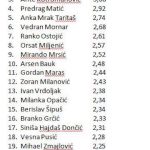The AIIB is an international development bank headquartered in Beijing, established in 2015 to support sustainable economic development, create wealth and improve infrastructure connectivity in the Asia-Pacific region. The Bank has a high AAA/Aaa rating and a capital of $100 billion.
AIIB’s operations are primarily focused on the Asian region, which accounts for 45% of the world economy and 60% of the world population.
According to its Corporate Strategy for 2021-2030, AIIB’s mission is defined as “Financing Infrastructure for Tomorrow”, and the Bank’s investments have to be aligned with at least one of the four thematic priorities: green infrastructure, connectivity and regional cooperation, technology-enabled infrastructure and private capital mobilisation.
However, the press release reads, the AIIB can finance projects in non-regional territory, primarily within the framework of investments aimed at supporting trade and connecting with the region, including ports, transport links, production and transmission of electricity, as well as investments in global public goods, such as projects for the production of renewable energy (including storage or transmission).
To date, the AIIB has approved membership for 104 countries, including 19 member states of the European Union, which places the bank among the top international financial institutions, just behind the International Monetary Fund and the World Bank, of which Croatia is also a member, the press release said.
In October this year, Croatia passed an act accepting AIIB’s Articles of Agreement, and as a signatory to the Agreement, Croatia subscribes to 50 shares of the original authorised capital stock, totalling $5 million, that is, 10 paid-in shares ($1 million), with payments to be made in five installments of $200,000, and 40 callable shares ($4 million), with payment subject to call.
According to an explanation of the act, Croatia’s membership of the Bank would increase the visibility of Croatian companies in tenders within the framework of projects financed by the AIIB in the region and beyond, which would ultimately contribute to the development of Croatia’s economy.
For more on politics, CLICK HERE.











